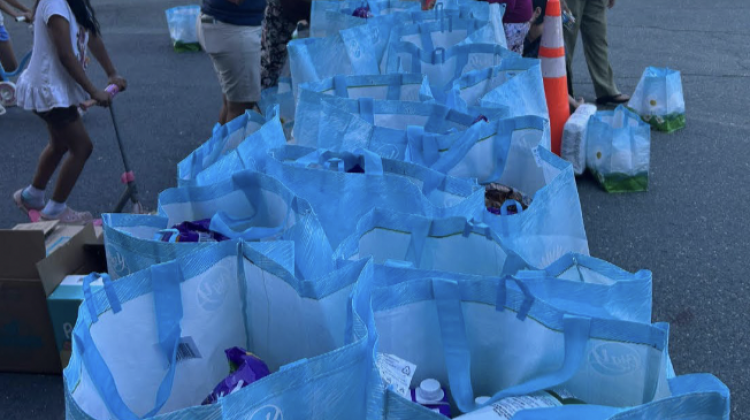LYNN — Community Schools are living up to their name in Lynn, thanks to the efforts of those directing them, as well as the students, families, and staff that have bought into the concept and are making it work.
Lynn Public Schools is in the second year of a partnership with the United Way, in which the nonprofit is funding a Community Schools director at the Ford Elementary School and Washington STEM Elementary School. By all accounts, the initiative is getting an A+ thus far.
“A Community School brings all the parties to the table to make sure we’re doing what’s best for kids,” said Anthony Frye, principal of the Washington STEM School, where Dr. Nina Cullen-Hamzah is the Community Schools director. “There were a lot of things being done in isolation. The director is the hub, allowing for the work to be done more effectively. She is a point of contact for people to reach out and hear a consistent voice.”
Cullen-Hamzeh and her counterpart at Ford, Amy Chruniak, said one of the main purposes of Community Schools is to remove barriers that limit access and engagement. The Community Schools concept is an academic strategy geared to improving student achievement.
“The pillars of a Community School are creating culture, belonging, safety and care,” said Cullen-Hamzeh, who attended a Community School in Boston as a child. “People feel safe, wanted and valued.”
At Washington STEM, families can access food, clothing and household goods through the school and community organizations and businesses, including Stop & Shop, which has stocked the food pantry for the last five years. The school, which also receives items from Flannery’s Handymen and Call the Girls, is converting space into a permanent food pantry, thrift shop and laundry area.
“Some of our families arrive (in the country) with just a suitcase,” Cullen-Hamzeh said. “We organize donations for them to come in and pick up food, clothing and housewares.”
Another key aspect of Community Schools is responding to needs and concerns put forth by parents. At Washington STEM, parents asked for English language instruction, so the school reached out to Pathways, which provides adult education and training, and was able to create a class for young adults aged 17-24. There is also an after-school program run in partnership with the New American Center.
“Increased engagement with families has an impact on the way kids view school,” Frye said. “There is a correlation with families feeling a sense of belonging.”
At Ford, Chruniak said the idea of a Community School is “to meet the needs of families here at school.” Last year, she conducted an asset and opportunities assessment and identified partners and other resources in the community. She also had individual interviews with parents so she could hear directly what they needed.
One of the major concerns expressed was traffic and pedestrian safety around the school. Parents pushed hard for a crossing guard, a traffic study was completed, and Ward 2 City Councilor Obed Matul got involved. This year, there is a crossing guard at Ford.
“We hear from parents when they want to see change and we work together to make that change happen,” Chruniak said.
There are several other initiatives that Chruniak pointed to as examples of the effectiveness of the Community School model at Ford, including after-school programming provided through Camp Fire North Shore, monthly food distribution, and Girls on the Run, an after-school club that combines social-emotional learning with running, culminating in the students running a 5K race in Boston.
“Physical activity helps the social, emotional, mental well-being,” Chruniak said.
Girls on the Run is also offered at Washington STEM, coordinated by Brittany Hockman Abbey. Both schools hold a monthly parent café, providing families the opportunity to share concerns and ideas with each other and the school.
The Community Schools concept has been embraced by the LPS administration as well as the Lynn Teachers Union and their parent organization, the American Federation of Teachers.
“We are seeing tangible success of the Community Schools program,” said Superintendent of Schools Dr. Evonne Alvarez. “We appreciate the investment of the United Way and the efforts of the community schools directors and the teachers and staff to make this work.”
To recognize the contributions of the directors, Sept. 15-21 was Community School Directors Appreciation Week in Lynn and across the country.
“We were more than happy to join the effort and get the AFT involved,” said Sheila O’Neil, president of the Lynn Teachers Union. “They sponsored a group of us (from LPS) to go to a Community Schools forum in Atlanta last spring. We know Community Schools help with attendance. Families are invested and it has been successful across the country. It’s an extremely important initiative that Lynn has started.”
United Way is advancing the Community School strategy as part of its New Way Forward plan to advance an economically just region. Hiring Community School directors is a key element of the strategy.
“We’ve become students of the Community Schools model and we understand the framework and strategy,” said Sarah Link, Senior Vice President, Community Impact for United Way of Massachusetts Bay.
Link said with the United Way having enjoyed a decades-long partnership with LPS and a network of nonprofits in the city, supporting the Community Schools program made sense.
“With our relationships in Lynn, we see this as an opportunity to bring people together with a uniform strategy to support student achievement,” Link said. “The United Way is an intermediary organization in this effort. We’re the hub of the wheel that brings everyone together to set goals and share ideas. It’s not easy work, but the kids need us to get it right.”

